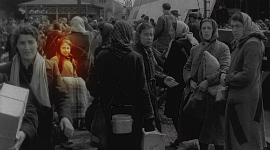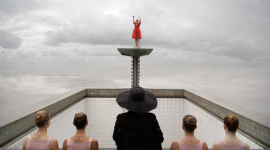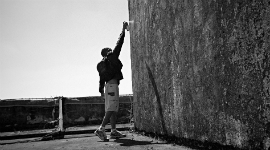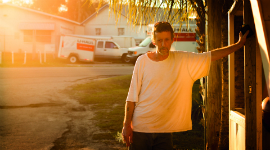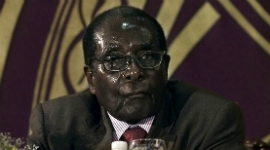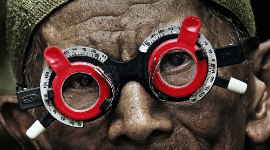Pro Tools
FILMFESTIVALS | 24/7 world wide coverage
Welcome !
Enjoy the best of both worlds: Film & Festival News, exploring the best of the film festivals community.
Launched in 1995, relentlessly connecting films to festivals, documenting and promoting festivals worldwide.
Working on an upgrade soon.
For collaboration, editorial contributions, or publicity, please send us an email here.
|
Here are the nominees for Best Nordic Documentary 2015
|
|
|

|
|
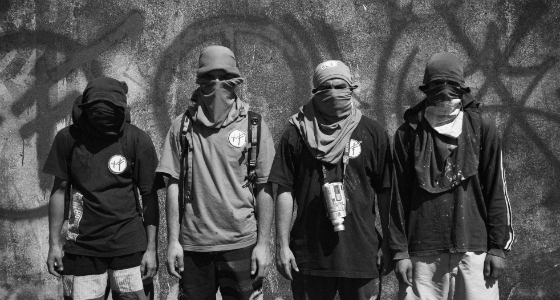
|
|
Here Are the Nominees for the Largest Documentary Film Prize in the Nordic Countries
French sadomasochism, Canadian social workers and an American free zone for convicted pedophiles are all found in the eight films nominated for the Dragon Award Best Nordic Documentary 2015. The prize sum of 100,000 SEK makes this the Nordic countries’ largest festival award for a documentary film.
One of the nominated films is The Look of Silence — Joshua Oppenheimer’s follow-up to the esteemed screenplay, The Act of Killing. Oppenheimer will also be visiting Göteborg during the festival and will hold a Master Class there.
Also nominated for the prestigious award are Magnus Gertten, who’s currently in the news for the film A Thousand Pieces (Tusen Bitar); the feature film debutantes Frida Kempff and Lina Mannheimer; and Frida and Lasse Barkfors whose film Pervert Park is simultaneously being screened at the Sundance Film Festival.
An exciting addition to the 2015 festival is Telia’s support as one of the award partners. The winning filmmaker is provided with 100,000 SEK, which makes this the largest documentary film prize in the Nordic countries.
“This year’s competition confirms the trend that Nordic documentary filmmakers are eager to turn their cameras towards the world and are active in international contexts. We are also very happy about the increased prize sum, which strengthens the festival’s position as a leading arena for Nordic documentary film,” says Jonas Holmberg, artistic director at the Göteborg Film Festival.
The award for Best Nordic Documentary will be handed out at the Dragon Award gala January 31 at Lindholmen Science Park. Read more about the eight nominated films below.
|
|

|
|
Every Face has a Name
Director: Magnus Gertten, Sweden.
On April 28, 1945, a ship arrives in Malmö harbor with prisoners of war and survivors from the Nazi concentration camps. In the newsreels we see hundreds of anonymous people stepping ashore. Many smile and wave while others stand aside with inscrutable facial expressions. Based on extensive research, filmmaker Magnus Gertten follows up his work which began with Harbor of Hope (2011), tracking down several of the people who appear in the pictures, asking them to tell their story. The result is a gripping testimony to the moment of liberation. It’s in this striking parallel to today’s reception of refugees that the film achieves absolute focus with respect to the importance of identification and it’s there our empathy and solidarity become painfully obvious. World premiere at the Göteborg Film Festival.
|

|
Winter Buoy
Director: Frida Kempff, Sweden.
In a gray and cold Toronto, a group of social workers fight to help pregnant, homeless and drug addicted women change their lives so they can keep their newborns. Frida Kempff’s short films have received several awards at film festivals throughout the world. Here in her feature film debut, these incredible female fates are portrayed with tremendous visual power. The mood is at times nearly meditative. The still images linger for a moment and let the viewer take time to reflect over how fragile life can be—and ruminate on the importance of hope. World premiere at the Göteborg Film Festival.
|
|

|
|

|
|

|
|
Good Girl
Director: Solveig Melkeraaen, Norway.
Despite great success both at home and internationally, director Solveig Melkeraaen suddenly succumbs to a deep depression. As a documentary filmmaker her path to improvement is obvious: she must make a film about the illness and about treatment, electric shock therapy. This is a film that deals with several taboos while simultaneously using rich humor and self-criticism to direct the camera inwards at a fragile yet indescribably strong women. Melkeraaen makes us want to rebel against the good-girl syndrome once and for all, by means of something as unexpected as a feel-good film about depression.
|

|
Pixadores
Director: Amir Escandari, Finland.
Djan, William, Ricardo and Biscoito live in the outskirts of Sao Paulo. Violence, poverty and alienation permeate their lives, but they find energy in the polemic street art movement that has become known as pixação. As recklessly as illegally, the young men climb up onto Sao Paulo’s highest buildings to spray their “pixo.” Are their paintings art or crime? Once they are invited to an art biennial in Berlin, there arise inevitable culture clashes and conflicts between the rules of the established art world and the four unruly street artists.
|
|

|
|

|
|

|
|
Pervert Park
Directors: Frida Barkfors and Lasse Barkfors, Sweden/Denmark.
Florida’s tough legislation makes it difficult for convicted sex offenders to return to society after being released from correctional facilities. They are prohibited from being in the vicinity of children. Their homes are registered, marked out and published in registers and apps. No one wants a pedophile as their neighbor. That’s why one hundred sex offenders have settled down in Florida Justice Transitions, a trailer park that serves as a free zone for the damned. The place is called Pervert Park, and here they can have picnics in peace. The sex offenders openly tell viewers about their monstrous crimes and difficult lives in an intimate and sensitive depiction of everyday life that doesn’t allow the viewer to dodge difficult questions about the limits of forgiveness.
|

|
Democrats
Director: Camilla Nielsson, Denmark.
In the aftermath of Zimbabwe’s violent election in 2008, which resulted in Robert Mugabe and his party ZANU-PF retaining power, a new constitution is to be drawn up with a broader base among the people. Two political opponents, Paul Mangwana from ZANU-PF and Douglas Mwaonzora from the oppositional party MDC are appointed to lead the work, which initially means collecting the people’s opinions about how the country should be governed. Despite assurances that the preparatory work for the new constitution will be carried out in peace without pressure from either party, it doesn’t take long before the series of events takes an ominous turn. We follow Mangwana and Mwaonzora’s work close-up and get a unique insight into the political power struggle in Zimbabwe.
|
|

|
|

|
|

|
|
The Look of Silence
Director: Joshua Oppenheimer, Denmark.
Through Joshua Oppenheimer’s work with filming the perpetrators of the Indonesian killings of 1965–66, a family that survived the events discovers how their son was murdered—and by whom. The family’s youngest son wonders how he can let his children grow up in a society where the survivors are scared into silence, and where people don’t dare but treat the murderers as heroes. In his search for answers, he decides to confront all those who are still alive and were involved in his brother’s murder. Based on this, the film presents an extraordinary and unique dialog.
Joshua Oppenheimer will be visiting Göteborg and will hold a Master Class during the festival.
|

|
The Ceremony
Director: Lina Mannheimer, Sweden.
In an extravagant house in Paris, people gather for sexual ceremonies in luxurious environments. The 83-year-old author, Catherine Robbe-Grillet is the brains and heart behind the erotic role playing. She is the dominatrix who controls what goes on and her partner, who is 31 years her junior, has promised to submit to her smallest command. Lina Mannheimer portrays a puzzling, intellectual and deeply fascinating woman who, accompanied by her husband Alain Robbe-Grillet, has dedicated herself to investigating sex both in life and in literature. The sadomasochistic ceremonies are presented with an intense presence and cinematic focus in this beautiful and thought-provoking debut film about desire, power and silk scarves.
|
|
|
|

|
|

|
|

|
|
|
|

|
|

|
|
|
 Chatelin Bruno
Chatelin Bruno 

















